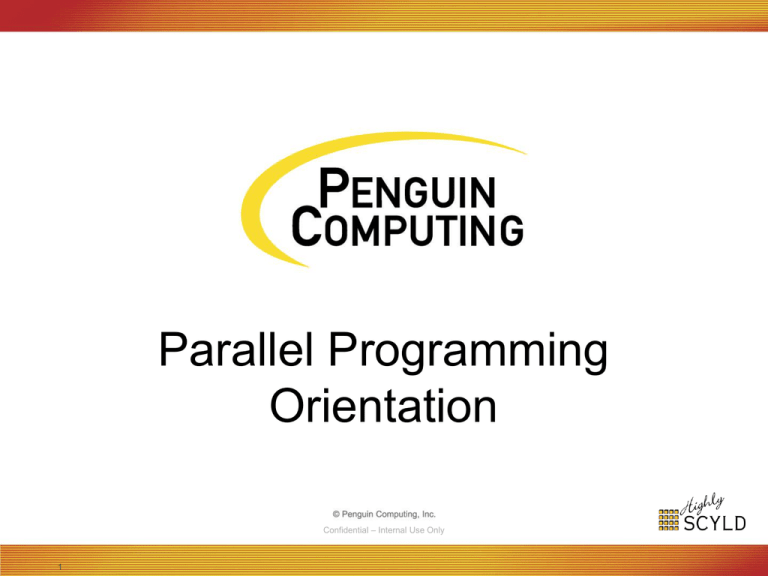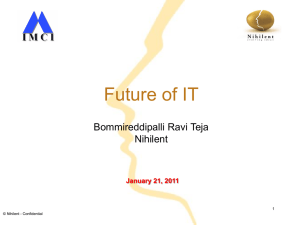OpenMP
advertisement

Parallel Programming
Orientation
Confidential – Internal Use Only
1
Agenda
Parallel jobs
» Paradigms to parallelize algorithms
» Profiling and compiler optimization
» Implementations to parallelize code
• OpenMP
• MPI
Queuing
» Job queuing
» Integrating Parallel Programs
Questions and Answers
2
Confidential – Internal Use Only
Traditional “Ad-Hoc” Linux Cluster
Full Linux install to disk; Load
into memory
» Manual & Slow; 5-30 minutes
Full set of disparate daemons,
services, user/password, &
host access setup
Interconnection Network
Master Node
Basic parallel shell with
complex glue scripts run jobs
Monitoring & management
added as isolated tools
Internet or Internal Network
3
Confidential – Internal Use Only
Cluster Virtualization Architecture Realized
Optional Disks
Minimal in-memory OS with single
daemon rapidly deployed in seconds no disk required
» Less than 20 seconds
Virtual, unified process space enables
intuitive single sign-on, job
submission
» Effortless job migration to nodes
Interconnection Network
Monitor & manage efficiently from the
Master
» Single System Install
» Single Process Space
» Shared cache of the cluster state
Master Node
» Single point of provisioning
» Better performance due to lightweight
nodes
Internet or Internal Network
4
» No version skew is inherently more
reliable
Confidential – Internal Use Only
Just a Primer
Only a brief introduction is provided here. Many other
in-depth tutorials are available on the web and in
published sources.
» http://www.mpi-forum.org/docs/mpi-11-html/mpi-report.html
» https://computing.llnl.gov/?set=training&page=index
5
Confidential – Internal Use Only
Parallel Code Primer
Paradigms for writing parallel programs depend upon the
application
» SIMD (single-instruction multiple-data)
» MIMD (multiple-instruction multiple-data)
» MISD (multiple-instruction single-data)
SIMD will be presented here as it is a commonly used template
» A single application source is compiled to perform operations on
different sets of data (Single Program Multiple Data (SPMD) model)
» The data is read by the different threads or passed between threads via
messages (hence MPI = message passing interface)
• Contrast this with shared memory or OpenMP where data is locally via
memory
• Optimizations in the MPI implementation can perform localhost
optimization; however, the program is still written using a message
passing construct
6
Confidential – Internal Use Only
Explicitly Parallel Programs
Different paradigms exist for parallelizing programs
» Shared memory
» OpenMP
» Sockets
» PVM
» Linda
» MPI
Most distributed parallel programs are now written
using MPI
» Different options for MPI stacks: MPICH, OpenMPI, HP, Intel
» ClusterWare comes integrated with customized versions of
MPICH and OpenMPI
7
Confidential – Internal Use Only
Example Code
Calculate p through numerical integration
» Compute p by integrating f(x) = 4/(1 + x**2) from 0 to 1
• Function is the derivative of arctan(x)
• See source code
8
Confidential – Internal Use Only
Compiling and running code
set n = 400,000,000
$ gcc -o cpi-serial cpi-serial.c
$ time ./cpi-serial
Process 0
pi is approximately 3.1415926535895520, Error is 0.0000000000002411
real
user
sys
0m11.009s
0m11.007s
0m0.000s
$ gcc -g -pg -o cpi-serial_prof cpi-serial.c
$ time ./cpi-serial_prof
Process 0
pi is approximately 3.1415926535895520, Error is 0.0000000000002411
real
0m11.012s
user
0m11.010s
sys
0m0.000s
$ ls -ltra
total 40
…
-rw-rw-r-- 1 jhan jhan
9
586 Mar
7 14:45 gmon.out
Confidential – Internal Use Only
Profiling
-g flag includes debugging information in the binary. Useful for gdb tracing of an
application and for profiling
-pg flag generates code to writing profile information
$ gprof cpi-serial_prof gmon.out
Flat profile:
Each sample counts as 0.01 seconds.
%
cumulative
self
self
total
time
seconds
seconds
calls ns/call ns/call name
74.48
2.85
2.85
main
23.95
3.77
0.92 400000000
2.29
2.29 f
2.37
3.86
0.09
frame_dummy
Call graph (explanation follows)
granularity: each sample hit covers 2 byte(s) for 0.26% of 3.86 seconds
index % time
self
children
called
name
<spontaneous>
2.85
0.92
main [1]
0.92
0.00 400000000/400000000
f [2]
----------------------------------------------0.92
0.00 400000000/400000000
main [1]
[2]
23.8
0.92
0.00 400000000
f [2]
----------------------------------------------<spontaneous>
[3]
2.3
0.09
0.00
frame_dummy [3]
----------------------------------------------[1]
97.7
-A flag to gprof shows calls next to source code
10
Confidential – Internal Use Only
Profiling Tips
Code should be profiled using realistic data set
» Contrast the call graphs of n=100 versus n=400,000,000
Profiling can give tips about where to optimize the
current algorithm, but it can’t suggest alternative
(better) algorithms
» e.g. Monte Carlo algorithm to calculate p
Amdahl’s Law
» The speedup parallelization achieves is limited by the serial
part of the code
11
Confidential – Internal Use Only
OpenMP Introduction
Parallelization using shared memory in a single
machine
» Portion of the code is forked on the machine to parallelize
» i.e. not distributed parallelization
Done using pragmas in the source code. Compiler
must support OpenMP (gcc 4, Intel, etc.)
» $ gcc -fopenmp -o cpi-openmp cpi-openmp.c
» See Source Code
Profiling can add overhead to resulting executable
‘time’ can be used to measure improvement
Runtime selection of the number of threads using
OMP_NUM_THREADS environment variable
12
Confidential – Internal Use Only
Scaling with OpenMP
$ time OMP_NUM_THREADS=1 ./cpi-openmp
Process 0
pi is approximately 3.1415926535895520, Error is 0.0000000000002411
real
0m10.583s
user
0m10.581s
sys
0m0.001s
$ time OMP_NUM_THREADS=2 ./cpi-openmp
Process 0
Process 1
pi is approximately 3.1415926535900218, Error is 0.0000000000002287
real
0m5.295s
user
0m11.297s
sys
0m0.000s
$ time OMP_NUM_THREADS=4 ./cpi-openmp
…
real
0m2.650s
user
0m10.586s
sys
0m0.003s
$ time OMP_NUM_THREADS=8 ./cpi-openmp
…
real
0m1.416s
user
0m11.294s
sys
0m0.001s
13
Confidential – Internal Use Only
Scaling with OpenMP
OpenMP Speedup
9
8
7
Speedup
6
5
Ideal Speedup
4
Speedup
3
2
1
0
0
1
2
3
4
5
6
7
8
9
Number of Processors
Code is easy to parallelize
Good scaling is seen up to 8 processors, kink in the curve is expected
14
Confidential – Internal Use Only
Role of the Compiler
Parallelization using shared memory in a single
machine
» i.e. not distributed parallelization
Done using pragmas in the source code. Compiler
must support OpenMP (gcc 4, Intel, etc.)
» $ gcc -fopenmp -o cpi-openmp cpi-openmp.c
Profiling can add overhead to resulting executable
‘time’ can be used to measure improvement
Runtime selection of the number of threads using
OMP_NUM_THREADS environment variable
15
Confidential – Internal Use Only
GCC versus Intel C
$ time OMP_NUM_THREADS=1 ./cpi-openmp
…
real
0m10.583s
user
0m10.581s
sys
0m0.001s
$ gcc -O3 -fopenmp -o cpi-openmp-gcc-O3 cpi-openmp.c
$ time OMP_NUM_THREADS=1 ./cpi-openmp-gcc-O3
Process 0
pi is approximately 3.1415926535895520, Error is 0.0000000000002411
real
0m3.154s
user
0m3.143s
sys
0m0.011s
$ time OMP_NUM_THREADS=8 ./cpi-openmp-gcc-O3
…
real
0m0.399s
user
0m3.181s
sys
0m0.001s
$ icc -openmp -o cpi-openmp-icc cpi-openmp.c
$ time OMP_NUM_THREADS=1 ./cpi-openmp-icc
Process 0
pi is approximately 3.1415926535899272, Error is 0.0000000000001341
real
0m1.618s
user
0m1.575s
sys
0m0.000s
$ time OMP_NUM_THREADS=8 ./cpi-openmp-icc
…
real
0m0.204s
user
0m1.584s
sys
0m0.001s
16
Confidential – Internal Use Only
Compiler Timings
17
Confidential – Internal Use Only
Explicitly Parallel Programs
Different paradigms exist for parallelizing programs
» Shared memory
» OpenMP
» Sockets
» PVM
» Linda
» MPI
Most distributed parallel programs are now written
using MPI
» Different options for MPI stacks: MPICH, OpenMPI, HP, Intel
» ClusterWare comes integrated with customized versions of
MPICH and OpenMPI
18
Confidential – Internal Use Only
OpenMP Summary
OpenMP provides a mechanism to parallelize within a
single machine
Shared memory and variables are handled
“automatically”
Performance, with an appropriate compiler, can provide
significant speedups
Coupled with large core count SMP machines, OpenMP
could be all of the parallelization required
» GPU programming is similar to the OpenMP model
19
Confidential – Internal Use Only
Explicitly Parallel Programs
Different paradigms exist for parallelizing programs
» Shared memory
» OpenMP
» Sockets
» PVM
» Linda
» MPI
Most distributed parallel programs are now written
using MPI
» Different options for MPI stacks: MPICH, OpenMPI, HP, Intel
» ClusterWare comes integrated with customized versions of
MPICH and OpenMPI
20
Confidential – Internal Use Only
Running MPI Code
Binaries are executed simultaneously
» on the same machine or different machines
After the binaries start running, the
MPI_COMM_WORLD is established
Any data to be transferred must be explicitly
determined by the programmer
Hooks exist for a number of languages
» E.g. Python (https://computing.llnl.gov/code/pdf/pyMPI.pdf)
21
Confidential – Internal Use Only
Example MPI Source
cpi.c calculates p using MPI in C
compute pi by integrating
f(x) = 4/(1 + x**2)
#include "mpi.h"
#include <stdio.h>
#include <math.h>
Terminates
Each
Does
Only
rank
worker
MPI_SUM
“0”
MPI
does
outputs
execution
function
this
the
loop
on
value
and
“1”
System
Initialize
Determines
Gets
Differentiate
MPI
Broadcasts
built-in
theinclude
the
name
“1”
function
the
MPI
actions
MPI_INT
of
file
size
rank
execution
the
which
to
based
of
of
get
the
the
increments
MPI_DOUBLE
of
environment
pi
the
at
counter
&mypi
by
on
the
all
defines
environment
group
calling
processor
on
time
from
rank.
value
&n
associated
process
the
from
Only
MPI
the
“master”
infunctions
process
with
the a
number of
workers
in processors (versus
communictor
communicator
performs
with
rank this
“0" to
action
all other
dividing the range -> possible
MPI_COMM_WORLD
to a
processes
of&pi
theongroup
off-by-one
single
valueerror)
at
rank “0”
while (!done)
{
if (myid == 0)
{
/*
printf("Enter the number of intervals: (0
quits) ");
scanf("%d",&n);
*/
if (n==0) n=100; else n=0;
startwtime = MPI_Wtime();
}
MPI_Bcast(&n, 1, MPI_INT, 0, MPI_COMM_WORLD);
if (n == 0)
done = 1;
else
{
h
= 1.0 / (double) n;
sum = 0.0;
for (i = myid + 1; i <= n; i += numprocs)
{
x = h * ((double)i - 0.5);
sum += f(x);
}
mypi = h * sum;
double f( double );
double f( double a )
{
return (4.0 / (1.0 + a*a));
}
int main( int argc, char *argv[])
{
int done = 0, n, myid, numprocs, i;
double PI25DT = 3.141592653589793238462643;
double mypi, pi, h, sum, x;
double startwtime = 0.0, endwtime;
int namelen;
char processor_name[MPI_MAX_PROCESSOR_NAME];
MPI_Reduce(&mypi, &pi, 1, MPI_DOUBLE,
MPI_SUM, 0, MPI_COMM_WORLD);
{
MPI_Init(&argc,&argv);
MPI_Comm_size(MPI_COMM_WORLD,&numprocs);
MPI_Comm_rank(MPI_COMM_WORLD,&myid);
MPI_Get_processor_name(processor_name,&namelen);
is %.16f\n",
fprintf(stderr,"Process %d on %s\n",
myid, processor_name);
}
}
printf("pi is approximately %.16f, Error
pi, fabs(pi - PI25DT));
endwtime = MPI_Wtime();
printf("wall clock time = %f\n",
endwtime-startwtime);
}
MPI_Finalize();
n = 0;
}
22
if (myid == 0)
return 0;
Confidential – Internal Use Only
Other Common MPI Functions
MPI_Send, MPI_Recv
» Blocking send and receive between two specific ranks
MPI_Isend, MPI_Irecv
» Non-blocking send and receive between two specific ranks
man pages exist for the MPI functions
Poorly written programs can suffer from poor communication efficiency
(e.g. stair-step) or lost data if the system buffer fills before a blocking
send or receive is initiated to correspond with a non-blocking receive or
send
Care should be used when creating temporary files as multiple threads
may be running on the same host overwriting the same temporary file
(include rank in file name in a unique temporary directory per simulation)
23
Confidential – Internal Use Only
Compiling MPICH programs
mpicc, mpiCC, mpif77, mpif90 are used to
automatically compile code and link in the correct MPI
libraries from /usr/lib64/MPICH
» Environment variables can used to set the compiler:
• CC, CPP, FC, F90
» Command line options to set the compiler:
• -cc=, -cxx=, -fc=, -f90=
» GNU, PGI, and Intel compilers are supported
24
Confidential – Internal Use Only
Running MPICH programs
mpirun is used to launch MPICH programs
Dynamic allocation can be done when using the –np
flag
Mapping is also supported when using the –map flags
If Infiniband is installed, the interconnect fabric can be
chosen using the machine flag:
» -machine p4
» -machine vapi
25
Confidential – Internal Use Only
Scaling with MPI
$ which mpicc
/usr/bin/mpicc
$ mpicc -show -o cpi-mpi cpi-mpi.c
gcc -L/usr/lib64/MPICH/p4/gnu -I/usr/include -o cpi-mpi cpi-mpi.c -lmpi lbproc
$ mpicc -o cpi-mpi cpi-mpi.c
$ time mpirun -np 1 ./cpi-mpi
Process 0 on scyld.localdomain
…
real
0m11.198s
user
0m11.187s
sys
0m0.010s
$ time mpirun -np 2 ./cpi-mpi
Process 0 on scyld.localdomain
Process 1 on n0
…
real
0m6.486s
user
0m5.510s
sys
0m0.009s
$ time mpirun -map -1:-1:-1:-1:-1:-1:-1:-1:0:0:0:0:0:0:0:0 ./cpi-mpi
…
real
0m1.283s
user
0m1.381s
sys
0m0.016s
26
Confidential – Internal Use Only
Environment Variable Options
Additional environment variable control:
» NP — The number of processes requested, but not the number of
processors. As in the example earlier in this section, NP=4 ./a.out will run
the MPI program a.out with 4 processes.
» ALL_CPUS — Set the number of processes to the number of CPUs
available to the current user. Similar to the example above, --all-cpus=1
./a.out would run the MPI program a.out on all available CPUs.
» ALL_NODES—Set the number of processes to the number of nodes
available to the current user. Similar to the ALL_CPUS variable, but you get
a maximum of one CPU per node. This is useful for running a job per node
instead of per CPU.
» ALL_LOCAL — Run every process on the master node; used for debugging
purposes.
» NO_LOCAL — Don’t run any processes on the master node.
» EXCLUDE — A colon-delimited list of nodes to be avoided during node
assignment.
» BEOWULF_JOB_MAP — A colon-delimited list of nodes. The first node
listed will be the first process (MPI Rank 0) and so on.
27
Confidential – Internal Use Only
Compiling and Running OpenMPI
programs
env-modules package allow users to change their
environment variables according to predefined files
» module avail
» module load openmpi/gnu
» GNU, PGI, and Intel compilers are supported
mpicc, mpiCC, mpif77, mpif90 are used to
automatically compile code and link in the correct MPI
libraries from /opt/scyld/openmpi
mpirun is used to run code
Interconnect can be selected at runtime
» -mca btl openib,tcp,sm,self
» -mca btl udapl,tcp,sm,self
28
Confidential – Internal Use Only
Compiling and Running OpenMPI
programs
What env-modules does:
Set user environment prior to compiling
» export PATH=/opt/scyld/openmpi/gnu/bin:${PATH}
mpicc, mpiCC, mpif77, mpif90 are used to automatically compile code and
link in the correct MPI libraries from /opt/scyld/openmpi
» Environment variables can used to set the compiler:
• OPMI_CC, OMPI_CXX, OMPI_F77, OMPI_FC
Prior to running PATH and LD_LIBRARY_PATH should be set
» module load openmpi/gnu
» /opt/scyld/openmpi/gnu/bin/mpirun –np 16 a.out
OR:
» export PATH=/opt/scyld/openmpi/gnu/bin:${PATH}
export MANPATH=/opt/scyld/openmpi/gnu/share/man
export LD_LIBRARY_PATH=/opt/scyld/openmpi/gnu/lib:${LD_LIBRARY_PATH}
» /opt/scyld/openmpi/gnu/bin/mpirun –np 16 a.out
29
Confidential – Internal Use Only
Scaling with MPI Implementations
30
Confidential – Internal Use Only
Scaling with MPI Implementations
Speedup relative to
GCC
Scaling with MPI for gcc
18
16
14
12
10
8
6
4
2
0
0
2
4
6
8
10
12
14
16
18
Number of Processors
Ideal Speedup 1:1
MPICC - GCC - P4
MPICC - GCC - VAPI
OpenMPI - GCC - tcp,sm,self
OpenMPI - GCC - openib,sm,self
Infiniband allows wider scaling
Performance difference between MPICH versus OpenMPI
A little artificial because it’s only two physical machines
31
Confidential – Internal Use Only
Scaling with MPI Implementations
Compiler Comparison
Speedup relative to GCC
60
50
40
30
20
10
0
0
2
4
6
8
10
12
14
16
18
Number of Processors
I deal Speedup 1: 1
M P I CC - GCC - P 4
M P I CC - GCC - V A P I
OpenM P I - GCC - t cp, sm, sel f
OpenM P I - GCC - openi b, sm, sel f
I deal Speedup 3. 49: 1
M P I CC - GCC -O3 - P 4
M P I CC - GCC -O3 - V A P I
M P I CC - I CC - P 4
M P I CC - I CC - V A P I
OpenM P I - GCC -O3 - t cp, sm, sel f
OpenM P I - GCC -O3 - openi b, sm, sel f
OpenM P I - I CC - t cp, sm, sel f
OpenM P I - I CC - openi b, sm, sel f
Larger problems would allow continued scaling
32
Confidential – Internal Use Only
MPI Summary
MPI provides a mechanism to parallelize in a
distributed fashion
» Localhost optimization is done is on a shared memory
machine
Shared variables are explicitly handled by the
developer
Tradeoff between CPU versus IO can determine the
performance characteristics
Hybrid programming models are possible
» MPI code with OpenMPI sections
» MPI code with GPU calls
33
Confidential – Internal Use Only
Queuing
How are resources allocated among multiple users
and/or groups?
» Statically by using bpctl user and group permissions
» ClusterWare supports a variety of queuing packages
• TaskMaster (advanced MOAB policy based scheduler integrated
ClusterWare)
• Torque
• SGE
34
Confidential – Internal Use Only
Interacting with Torque
To submit a job:
» qsub script.sh
• Example script.sh:
#!/bin/sh
#PBS –j oe
#PBS –l nodes=4
cd $PBS_O_WORKDIR
hostname
• qsub does not accept arguments for script.sh. All executable
arguments must be included in the script itself
» Administrators can create a ‘qapp’ script that takes user
arguments, creates script.sh with the user arguments
embedded, and runs ‘qsub script.sh’
35
Confidential – Internal Use Only
Interacting with Torque
Other commands
» qstat – Status of queue server and jobs
» qdel – Remove a job from the queue
» qhold, qrls – Hold and release a job in the queue
» qmgr – Administrator command to configure pbs_server
» /var/spool/torque/server_name: should match hostname of the head
node
» /var/spool/torque/mom_priv/config: file to configure pbs_mom
• ‘$usecp *:/home /home’ indicates that pbs_mom should use ‘cp’
rather than ‘rcp’ or ‘scp’ to relocate the stdout and stderr files at the end of
execution
» pbsnodes – Administrator command to monitor the status of the
resources
» qalter – Administrator command to modify the parameters of a
particular job (e.g. requested time)
36
Confidential – Internal Use Only
Other options to qsub
Options that can be included in a script (with the #PBS
directive) or on the qsub command line
» Join output and error files : #PBS –j oe
» Request resources: #PBS –l nodes=2:ppn=2
» Request walltime: #PBS –l walltime=24:00:00
» Define a job name: #PBS –N jobname
» Send mail at jobs events: #PBS –m be
» Assign job to an account: #PBS –A account
» Export current environment variables: #PBS –V
To start an interactive queue job use:
» qsub –I for Torque
» qrsh for SGE
37
Confidential – Internal Use Only
Queue script case studies
#!/bin/bash
qapp script:
» Be careful about
escaping special
characters in the
redirect section
(\$, \’, \”)
#Usage: qapp arg1 arg2
debug=0
opt1=“${1}”
opt2=“${2}”
if [[ “${opt2}” == “” ]] ; then
echo “Not enough arguments”
exit 1
fi
cat > app.sh << EOF
#!/bin/bash
#PBS –j oe
#PBS –l nodes=1
cd \$PBS_O_WORKDIR
app $opt1 $opt2
EOF
if [[ “${debug}” –lt 1 ]] ; then
qsub app.sh
fi
if [[ “${debug}” –eq 0 ]] ; then
/bin/rm –f app.sh
fi
38
Confidential – Internal Use Only
Queue script case studies
Using local scratch:
#!/bin/bash
#PBS –j oe
#PBS –l nodes=1
cd $PBS_O_WORKDIR
tmpdir=“/scratch/$USER/$PBS_JOBID”
/bin/mkdir –p $tmpdir
rsync –a ./ $tmpdir
cd $tmpdir
$pathto/app arg1 arg2
cd $PBS_O_WORKDIR
rsync –a $tmpdir/ .
/bin/rm –fr $tmpdir
39
Confidential – Internal Use Only
Queue script case studies
Using local scratch for
MPICH parallel jobs:
» pbsdsh is a Torque
command
#!/bin/bash
#PBS –j oe
#PBS –l nodes=2:ppn=8
cd $PBS_O_WORKDIR
tmpdir=“/scratch/$USER/$PBS_JOBID”
/usr/bin/pbsdsh –u “/bin/mkdir –p
$tmpdir”
/usr/bin/pbsdsh –u bash –c “cd
$PBS_O_WORKDIR ; rsync –a ./ $tmpdir”
cd $tmpdir
mpirun –machine vapi $pathto/app arg1
arg2
cd $PBS_O_WORKDIR
/usr/bin/pbsdsh –u “rsync –a $tmpdir/
$PBS_O_WORKDIR”
/usr/bin/pbsdsh –u “/bin/rm –fr $tmpdir”
40
Confidential – Internal Use Only
Queue script case studies
Using local scratch for
OpenMPI parallel jobs:
» Do a ‘module load
openmpi/gnu’ prior to
running qsub
» OR explicitly include a
‘module load
openmpi/gnu’ in the
script itself
#!/bin/bash
#PBS –j oe
#PBS –l nodes=2:ppn=8
#PBS -V
cd $PBS_O_WORKDIR
tmpdir=“/scratch/$USER/$PBS_JOBID”
/usr/bin/pbsdsh –u “/bin/mkdir –p
$tmpdir”
/usr/bin/pbsdsh –u bash –c “cd
$PBS_O_WORKDIR ; rsync –a ./ $tmpdir”
cd $tmpdir
/usr/openmpi/gnu/bin/mpirun –np `cat
$PBS_NODEFILE | wc –l` –mca btl
openib,sm,self $pathto/app arg1 arg2
cd $PBS_O_WORKDIR
/usr/bin/pbsdsh –u “rsync –a $tmpdir/
$PBS_O_WORKDIR”
/usr/bin/pbsdsh –u “/bin/rm –fr $tmpdir”
41
Confidential – Internal Use Only
Other considerations
A queue script need not be a single command
» Multiple steps can be performed from a single script
• Guaranteed resources
• Jobs should typically be a minimum of 2 minutes
» Pre-processing and post-processing can be done from the
same script using the local scratch space
» If configured, it is possible to submit additional jobs from a
running queued job
To remove multiple jobs from the queue:
» qstat | grep “ [RQ] “ | awk ‘{print $1}’ | xargs qdel
42
Confidential – Internal Use Only
Integrating Parallel Programs
The scheduler on keeps track of available resources
Don’t monitor how the resources are used
Onus is on the user to request and use the correct
resources
» OpenMP: be sure to requests multiple processors on the same
machine
• Torque: #PBS –l nodes=1:ppn=x
• SGE: Correct PE (parallel environment) submission
» MPI: be sure to the use the machines that have been assigned by
the queue system
• Torque: MPICH and OpenMPI mpirun will do the correct thing.
$PBS_NODEFILE contains a list of assigned hosts
• SGE: $PE_HOSTFILE contains a list of assigned hosts. OpenMPI’s
mpirun may need to be recompiled
43
Confidential – Internal Use Only
Integrating Parallel Programs
Be careful about task pinning (taskset)
» Different jobs may assuming the same CPU set resulting in
oversubscription of some cores and some free cores
» In a shared environment, not using task pinning can be easier
at a slight trade-off in performance
Make sure that the same MPI implementation and
compiler combination is used to run the code as was
used to compile and link
44
Confidential – Internal Use Only
Questions??
Confidential – Internal Use Only
45








